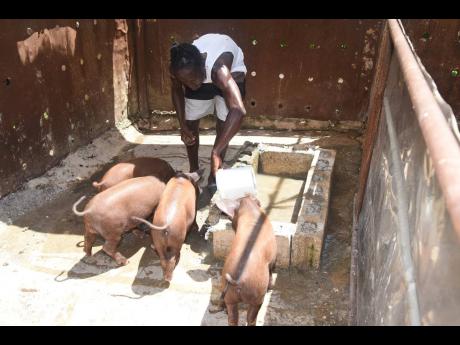As agri input costs rise, fears of future emerge
St Catherine farmer Jermaine Black, who became somewhat of a social-media sensation at the height of the coronavirus pandemic, has had to resort to generating his own feed for his livestock amid the skyrocketing cost of inputs.
A 25kg bag of chicken feed costs him around $2,700, he told The Gleaner on Sunday, while the unit cost for pig and goat feed runs him $2,400 and $2,200.
Those prices represent an average 20 per cent hike over pre-pandemic rates of $2,000, forcing him to slash feed purchases for his chickens to contain costs.
“I used to buy 20 bags of feeding. I can’t do that now. Mi have to buy like all even 10, and mi have to try and set myself for even five more. So mi have to buy them little-little now since them raise,” he said.
The livestock rearer and cultivator now pays a farmhand to cut grass and tree limbs for his goats and for his pigs and increasingly relies on vegetable peels.
That is the reality not only of Black but of thousands of Jamaican farmers buffeted by inflationary headwinds linked to global supply-chain woes dating back to 2021. That crisis is expected to escalate amid the military conflict between Ukraine and Russia, major producers of agricultural inputs like soya, grain, and fertiliser.
Animal feeds supplied by Nutramix climbed by five to seven per cent on Monday, but Alicia Bogues, head of regional development at parent CB Group, has warned that further increases might be on the horizon.
Bogues said that the company could no longer absorb price increases for raw materials. Holding prices at current levies was no longer sustainable, she added.
“Since January alone, commodity prices have sharply increased over 35 per cent and are at historic highs. We know these are challenging times, but we also believe in being transparent,” Bogues said in a Gleaner interview.
“With the current volatility of the commodity prices, the world should brace for the possibility of further increases in the future.”
DOMINO EFFECT
That is not welcome news for Lenworth Fulton, president of the Jamaica Agricultural Society (JAS), because of the domino effect from farm gate to household plate.
Expenditure for feed for goat farmers accounts for eight to 10 per cent of input costs while the ratio is 10 to 12 per cent for chicken rearers.
Black has called for the reduction of general consumption tax on feeds. But it is uncertain whether Finance Minister Dr Nigel Clarke, whose $912-billion Budget has been criticised by Opposition Leader Mark Golding, will depart from his philosophy of fiscal conservatism.
Fulton is recommending that some of the $2 billion allocated to provide support to Jamaicans most adversely affected by high fuel prices should be channelled to farmers to subsidise the costs for fertiliser.
Fertiliser is estimated to account for 10 per cent of cultivation costs.
“It is getting out of hand. A 25lb bag of urea is being sold for $4,130, and I know that up to a year and six months ago, you were getting that same bag for $1,600 or $1,700 per bag,” said Fulton.
“The tax is $538.70, so you see what the tax is doing for us, and in a time like this, I would have expected that the Government would be looking on reducing the taxation on some of these things,” said the JAS president, adding that one kilogram of fungicide costs between $2,000 and $3,000 per bag.
Minister of Agriculture and Fisheries Pearnel Charles Jr has sought to assuage the concerns of farmers, saying that the ministry would continue to provide assistance through its Production and Productivity Programme.
More important, the minister hinted that an announcement on fertiliser pricing was imminent, adding that Jamaica would be the beneficiary of international support.
Charles Jr shared that his ministry is working on identifying other markets and developing local alternatives such as composting.
“Major suppliers are now looking to other countries, such as in Africa, as a source of fertiliser. We expect that it will take some time for suppliers to shift their source, and so it’s anticipated that some negative impact may be felt,” Charles said in a Gleaner interview on Sunday.
“We are currently preparing a list of items to be submitted to the Ministry of Finance aimed at not just removing other duties on imported items necessary to enhance agriculture production.”
Those measures, he said, would include greenhouses and drone technology.

